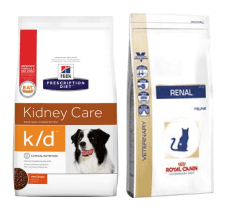Kidney Disease
(Chronic)Chronic kidney disease is a slowly progressive destruction of kidney tissue.
The kidneys have two very important functions:
The kidneys have two very important functions:
- The outer cortex of the kidneys function is to filter out waste from the blood stream and push these toxins into the urine.
- The inner medulla of the kidneys function to reabsorb water from the urine so the animal does not dehydrate.
The kidneys’ functions begin to become impaired when 75% of their tissue mass has been affected.
This causes toxins to build up within the blood stream, and the animal to become dehydrated.
Clinical Signs:
- Increased thirst and urination
- Dehydration
- Chronic weight loss
- Chronic vomiting
- Decreased appetite
- Diarrhoea / constipation
- Neurologic signs – seizure
- Hypertension (high blood pressure: may see permanently dilated pupils)
Cause of Disease:
The disease occurs as over 75% of the kidney tissue is slowly and progressively destroyed. The disease can affect both dogs and cats with chances increasing as the animal ages (mean age of onset is 9 years old). The Abyssinian and Persian Cats, and Bull Terrier, Cairn Terrier and German Shepherd have can have a genetic predisposition for kidney disease.

Treatment:
Short term goals:
- To help to clear the toxins from the blood stream by offering high levels of fluids to force the kidneys to push out the toxins while re-hydrating your pet (Diuresis). This process is done within the hospital using intravenous fluids over days. Intravenous fluids also correct electrolyte abnormalities.
- Decreasing stomach acid. The hormone that produces stomach acid is excreted in the kidney. During severe episodes, this hormone stays high in the body causing increased amounts of stomach acid. Antacid type medications are used to combat this change. This can make your pet feel nauseous, so often anti-nausea drugs are employed also.
Long term goals:
- Subcutaneous fluids: Once the kidneys have been flushed, and hydration status improved, giving sub-cutaneous fluids under the skin may allow the kidneys to maintain adequate hydration and detoxification.
- Potassium Supplementation: Giving oral potassium supplements can keep your pet’s electrolytes in balance and help maintain appetite.
- Drugs which decrease stomach acid production
- Hormones which stimulate red blood cell production (Erythropoetin): This hormone, which is produced by the kidney, stimulates red blood cell production. In advanced cases of chronic kidney disease this hormone is decreased, causing a low red blood cell count (anaemia).
- Diet: Prescription Diet k/d or Royal Canin Renal food is specially formulated by veterinarians to help manage animals with kidney disease. Kidney disease may develop because of other diseases or changes in health, breed/hereditary tendencies and even nutritional factors.
Please contact us immediately if:
- Vomiting or diarrhoea occur
- Decreased appetite
- Continued depression
- Neurologic signs: any overall change in your animal’s health.

